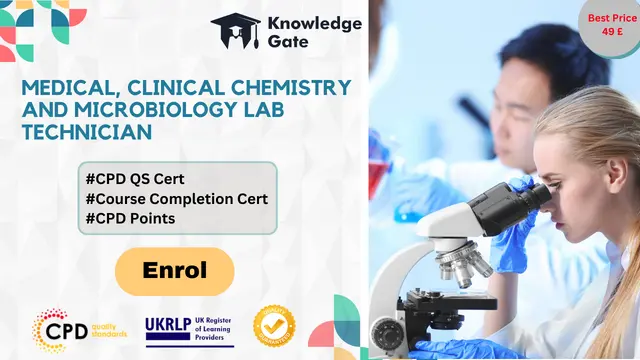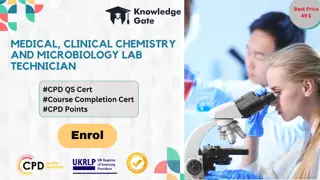
Medical, Clinical Chemistry and Microbiology Lab Technician
CPD Accredited>Instant Free Certificate! 5 Courses> CPDQS Certificate>Super Saver Deal
Knowledge Gate
Summary
- Reed Courses Certificate of Completion - Free
- Tutor is available to students
Add to basket or enquire
Overview
Embark on a journey to the forefront of scientific discovery with our "Medical, Clinical Chemistry and Microbiology Lab Technician" course bundle. This comprehensive program is meticulously crafted to immerse you in the world of laboratory science, blending the intricate aspects of microbiology, clinical chemistry, and lab operations. Through this course, you will delve into the microscopic universe, unravel the mysteries of the human body at a molecular level, and master the art of maintaining a safe, contamination-free laboratory environment. As the science field evolves, stay ahead of the curve; enrol in this course to transform your curiosity into expertise.
Learning Outcomes
Upon completion of this Medical, Clinical Chemistry and Microbiology Lab Technician bundle, you should be able to:
- Gain foundational knowledge in laboratory practices and protocols.
- Understand the role and functions of a microbiology lab technician.
- Acquire skills in clinical chemistry and medical laboratory techniques.
- Learn essential laboratory safety procedures and regulations.
- Develop techniques to prevent contamination in laboratory settings.
- Explore the practical application of microbiology and clinical chemistry.
CPD
Curriculum
Course media
Description
In this course, learners will be introduced to the dynamic realm of laboratory science, with a specific focus on the disciplines of medical laboratory, clinical chemistry, and microbiology. The curriculum is designed to provide a thorough understanding of the role and responsibilities of a laboratory technician. Starting with the Laboratory Technician Diploma, students will establish a strong foundation in laboratory practices. Progressing to the Microbiology Laboratory Technician course, learners will explore the fascinating world of microorganisms and their impact on health and disease. The Medical Laboratory & Clinical Chemistry Technicians course delves deeper into the biochemical analysis of bodily fluids, vital for disease diagnosis and treatment. Additionally, the Laboratory Safety course equips students with critical knowledge to maintain a safe working environment, crucial in any laboratory setting. Finally, Preventing Contamination in the Laboratory addresses one of the most significant challenges in lab work, ensuring learners are well-versed in maintaining the integrity of experimental results.
This Medical, Clinical Chemistry and Microbiology Lab Technician Bundle Consists of the following Premium courses:
- Course 01: Laboratory Technician
- Course 02: Microbiology Laboratory Technician
- Course 03: Medical Laboratory & Clinical Chemistry Technicians
- Course 04: Laboratory Safety
- Course 05: Preventing Contamination in the Laboratory
Who is this course for?
This course is ideal for:
- Individuals aspiring to become lab technicians.
- Those interested in microbiology and clinical chemistry.
- Medical professionals seeking to enhance their laboratory skills.
- Science graduates aiming to specialise in laboratory science.
- Individuals passionate about pursuing a career in healthcare research.
- Career changers looking to enter the scientific field.
Career path
Upon completion, graduates can explore various career opportunities, including:
- Laboratory Technician - Average salary: £22,000 per year.
- Microbiology Technician - Average salary: £24,000 per year.
- Clinical Chemistry Technician - Average salary: £26,000 per year.
- Lab Safety Officer - Average salary: £28,000 per year.
- Contamination Control Technician - Average salary: £25,000 per year.
Questions and answers
Currently there are no Q&As for this course. Be the first to ask a question.
Certificates
Reed Courses Certificate of Completion
Digital certificate - Included
Will be downloadable when all lectures have been completed.
Reviews
Currently there are no reviews for this course. Be the first to leave a review.
Legal information
This course is advertised on reed.co.uk by the Course Provider, whose terms and conditions apply. Purchases are made directly from the Course Provider, and as such, content and materials are supplied by the Course Provider directly. Reed is acting as agent and not reseller in relation to this course. Reed's only responsibility is to facilitate your payment for the course. It is your responsibility to review and agree to the Course Provider's terms and conditions and satisfy yourself as to the suitability of the course you intend to purchase. Reed will not have any responsibility for the content of the course and/or associated materials.


